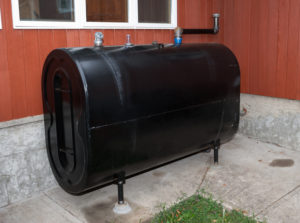Do You Have an Above Ground Oil Tank? Here’s What You Need to Know
 Do you have a home with an above ground oil tank? We understand that you may have some questions about location options and maintenance needs. But not to worry, Point Bay has been keeping families warm all winter long in Ocean and Monmouth counties since 1906. We’re here to provide you with the best information and top quality service around.
Do you have a home with an above ground oil tank? We understand that you may have some questions about location options and maintenance needs. But not to worry, Point Bay has been keeping families warm all winter long in Ocean and Monmouth counties since 1906. We’re here to provide you with the best information and top quality service around.
Location for an Above Ground Oil Tank
Contents
For above ground oil tanks, you have two location options: inside or outside. Even more than underground tanks, above ground oil tanks that are placed outside can be exposed to elements, often out of your control. Environmental factors such as wind, water, snow and debris, puts the tank at a higher risk of being damaged.
Above ground oil tanks located inside are not exposed to the elements and hazards as outdoor tanks. Yet, homeowners still need to be aware of certain considerations. For example, if the tank is in the garage, residents will need to be extra careful with their car and other tools. Ideally, an above ground tank should be placed in a cool, dry environment. Such as an unused basement or utility room.
Suggested Maintenance for an Above Ground Oil Tank
Above ground oil tanks are easier to inspect than underground oil tanks, simply because they are visible. They require the least amount of maintenance; if a homeowner experiences a problem with an above ground tank, they’ll most likely be aware of it sooner and able to address the problem right away.
Although it’s always best to contact a certified professional for a thorough maintenance check, here are a few suggested maintenance tips you can DIY to get started:
- Examine the tank legs (are they all intact?). Make sure they’re not beginning to rust, buckle or crack.
- Check the tank platform to ensure it isn’t deformed or cracked.
- Look for rust on metal tanks. Check the drain, pipes filter and valves.
- Record usage levels by checking the oil tank gauge as you use up your oil. Also, look at the gauge to make sure it’s not cracked or loosened.
- Protect outdoor tanks from strong winds and falling snow or ice. Trim nearby trees so branches are not likely to fall on the tank and fence off the sides of the tank so lines and filters won’t get run over by a mower.
- Check vents for clogs or corrosion. Make sure they’re not broken or missing.
Above Ground Oil Tank
Preventative maintenance is one of the best ways to extend the operating life of your oil tank. According to the Environmental Protection Agency, heating equipment that is properly maintained uses 13% less fuel than units that are not. Repairs can end up being costlier in the long run.
Contact us today for a free, convenient estimate. One of our trained equipment professionals will set up an appointment to come out to meet with you to discuss the best options for your home. Call 732-349-5059.
